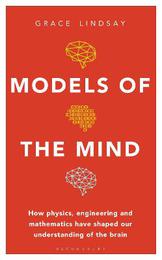
|
Models of the Mind: How Physics, Engineering and Mathematics Have Shaped Our Understanding of the Brain
Hardback
Main Details
| Title |
Models of the Mind: How Physics, Engineering and Mathematics Have Shaped Our Understanding of the Brain
|
| Authors and Contributors |
By (author) Grace Lindsay
|
| Physical Properties |
| Format:Hardback | | Pages:400 | | Dimensions(mm): Height 216,Width 135 |
|
| Category/Genre | Maths for scientists
History of science
Popular science
Neurosciences |
|---|
| ISBN/Barcode |
9781472966421
|
| Classifications | Dewey:612.8233 |
|---|
| Audience | |
|---|
| Illustrations |
black and white illustrations throughout
|
|
Publishing Details |
| Publisher |
Bloomsbury Publishing PLC
|
| Imprint |
Bloomsbury Sigma
|
| NZ Release Date |
4 May 2021 |
| Publication Country |
United Kingdom
|
Description
The human brain is made up of 85 billion neurons, which are connected by over 100 trillion synapses. For more than a century, a diverse array of researchers searched for a language that could be used to capture the essence of what these neurons do and how they communicate - and how those communications create thoughts, perceptions and actions. The language they were looking for was mathematics, and we would not be able to understand the brain as we do today without it. In Models of the Mind, author and computational neuroscientist Grace Lindsay explains how mathematical models have allowed scientists to understand and describe many of the brain's processes, including decision-making, sensory processing, quantifying memory, and more. She introduces readers to the most important concepts in modern neuroscience, and highlights the tensions that arise when the abstract world of mathematical modelling collides with the messy details of biology. Each chapter of Models of the Mind focuses on mathematical tools that have been applied in a particular area of neuroscience, progressing from the simplest building block of the brain - the individual neuron - through to circuits of interacting neurons, whole brain areas and even the behaviours that brains command. In addition, Grace examines the history of the field, starting with experiments done on frog legs in the late eighteenth century and building to the large models of artificial neural networks that form the basis of modern artificial intelligence. Throughout, she reveals the value of using the elegant language of mathematics to describe the machinery of neuroscience.
Author Biography
Grace Lindsay is a computational neuroscientist currently based at University College London. She completed her PhD at the Center for Theoretical Neuroscience at Columbia University, where her research focused on building mathematical models of how the brain controls sensory processing. Before that, she earned a bachelor's degree in Neuroscience from the University of Pittsburgh and received a research fellowship to study at the Bernstein Center for Computational Neuroscience in Freiburg, Germany. She was awarded a Google PhD Fellowship in Computational Neuroscience in 2016 and has spoken at several international conferences.
ReviewsGrace Lindsay provides a masterful tour of this important frontier, tackling intimidating topics with verve and wit. * Sean Carroll * This is a remarkable book ... an excellent introduction to an area that few of us probably know anything about, and all the more fascinating because of that. * Popular Science * Models of the Mind is a grand tour through the history of computational neuroscience, from its humble beginnings in information theory and neuron structure up to its modern manifestations harnessing supercomputers to run large scale convolutional neural networks that model important brain systems. * Women You Should Know * The book is not only wide-ranging in its choice of topics but is also a lively journey through the history of these efforts and traces the lives of the eccentric and fascinating scientists who were instrumental in figuring out the brain's working by using tools ranging from information theory and graph theory to Bayesian modeling and neural networks. * 3 Quarks Daily * 'Enthralling, erudite and accessible ... an engrossing history of science and an enlightening guide to neuroscience's current frontiers.' * Liam Drew, Neurobiologist and author of I, Mammal: The Story of What Makes Us Mammals * 'This book is an anthology of the scientific poetry that has illuminated our studies and conceptions of the brain.' * Professor Larry Abbott, Center for Theoretical Neuroscience, Columbia University *
|